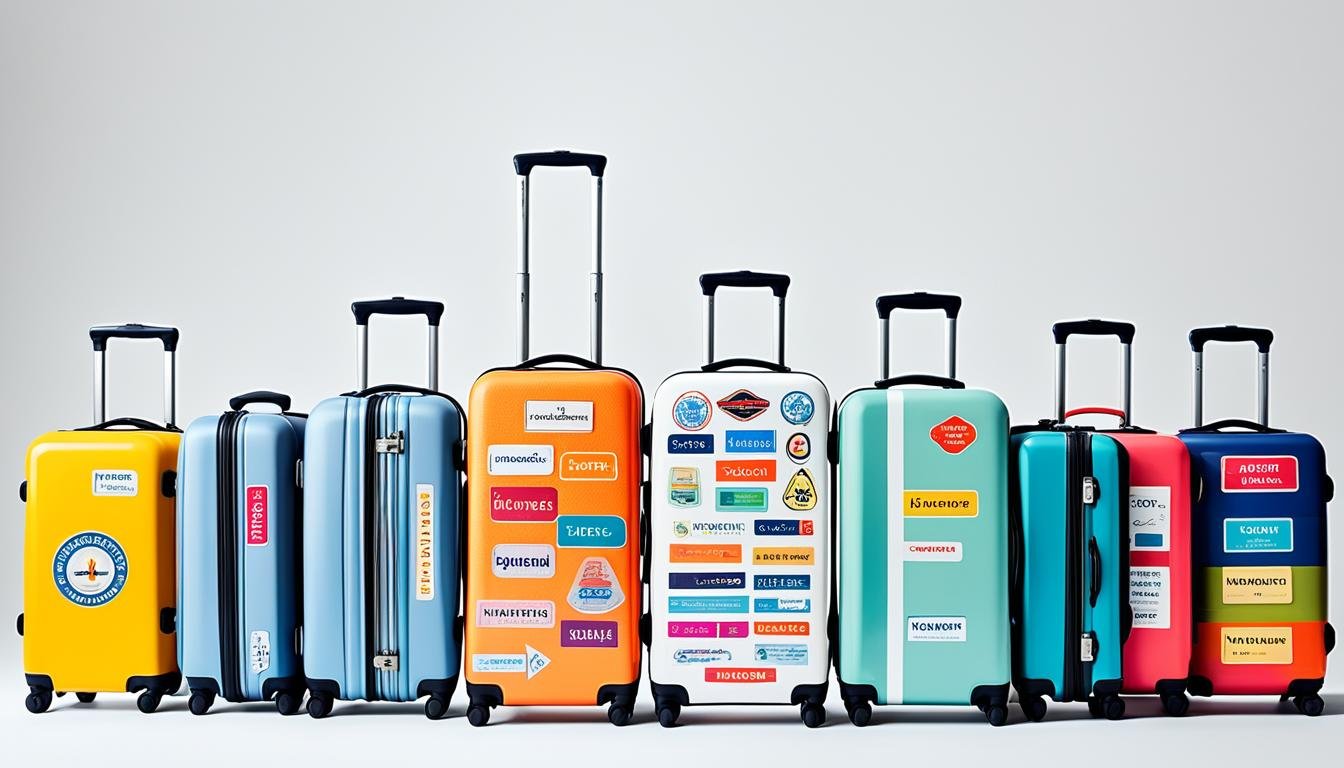Travel insurance gives you protection for your nonrefundable trip costs. It covers risks like flight cancellations, lost bags, or health emergencies. This gives you peace of mind and financial protection if the unexpected happens.
Different travel insurance plans exist. Companies such as Allianz and Travel Guard have various policies. These can include coverage for trip cancellations, help in medical emergencies, lost baggage, or even if your travel is delayed. It’s key to check each plan’s details to see if it meets your needs.
Knowing what your travel insurance covers is essential. This helps you decide if it’s a good choice for you. Look into the features and benefits of each policy to make an informed choice.
Key Takeaways:
- Travel insurance is important for protecting your vacation money and managing travel risks.
- You can pick from many types of coverage, from trip cancellations to lost baggage.
- Companies like Allianz and Travel Guard have different plans with varied benefits and costs.
- It’s crucial to understand what your policy covers to see its real value.
- Reviewing coverage and benefits helps you decide if travel insurance is a smart buy for you.
Understanding Travel Insurance Coverage and Benefits
When buying travel insurance, it’s key to understand what it covers. This helps you choose wisely. Knowing what’s covered and what’s not ensures you’re fully protected. Consider these vital points:
- Comprehensive Coverage: Seek insurance that safeguards against many risks, like trip cancellations and lost baggage. Choosing such coverage brings peace of mind for any trip’s unexpected events.
- Exclusions: Learn what your policy might not cover, such as pre-existing health conditions or extreme sports accidents. But, some plans can include these if you meet specific rules. Always check the policy’s fine print.
- Cancel for Any Reason (CFAR) Coverage: For more freedom, a CFAR option lets you cancel and get some money back for any reason, not just common covered reasons. It’s good for when plans might change suddenly.
It’s wise to compare insurance options to find what fits your needs best. Look at the trip length, where you’re going, and what you’ll be doing. This guides you to the right plan for you.
Remember, not all travel insurance is the same. Customize based on your personal needs to cover all bases while traveling.
Comparison of Travel Insurance Coverage
| Travel Insurance Provider | Comprehensive Coverage | Trip Cancellation | Emergency Medical Expenses | Baggage Loss | Travel Delay |
|---|---|---|---|---|---|
| Allianz | Yes | Yes | Yes | Yes | Yes |
| Travel Guard | Yes | Yes | Yes | Yes | Yes |
| AXA | Yes | Yes | Yes | Yes | Yes |
Comparing plans from different companies is smart. The table gives a quick view of what Allianz, Travel Guard, and AXA offer. But, always delve into the full policy to be sure it’s right for you.
When is Travel Insurance Necessary?
Travel insurance is a smart choice in many situations. It’s important if you have costs that you can’t get back. Or if you’re going to a place where flights are often delayed, or the weather is bad. It’s also key for health care coverage when you’re away. Make sure to think about the risks and what insurance you need for your trip.
The Value of Nonrefundable Trip Costs
Having nonrefundable trip costs makes travel insurance very important. This usually means money for flights, places to stay, and things to do that you can’t get back if you change your mind. With insurance, you can cover these costs and get money back if something unexpected happens to your trip.
Protection Against Flight Disruptions and Severe Weather
If you’re going somewhere with a high chance of flight delays or bad weather, insurance becomes vital. Imagine your flights being canceled, or a natural disaster affecting your travel. Insurance can help with costs for new flights, extra stays, or emergency help.
Coverage for Medical Emergencies
No one plans to get sick or hurt while traveling. But having insurance ensures you’re taken care of. It can pay for health care, or even get you home if needed. It also connects you with doctors and advice so you’re not alone.
Credit cards might have some insurance, but it’s often not enough. Standalone insurance gives you better and broader coverage designed for your trip. It’s not always expensive and depends on how long you’re going and where.
Choosing the Right Travel Insurance Plan
It’s key to compare different travel insurance plans before choosing one. Look at various options and think about what you need. This way, you’ll pick a plan that meets your travel protection needs.
Assess Your Coverage Requirements
First, figure out what coverage you need. Think about things like canceling your trip, medical emergencies, and losing bags. You want a policy that covers these well, so you’re safe if something unexpected happens.
Review Policy Details
After knowing your needs, check the policies closely. Look at the details like what’s covered, what’s not, and extra benefits. This helps you find a policy that fits what you need and want.
Checking customer reviews of different insurance companies is smart. It tells you how happy their customers are and how reliable they are.
Compare Prices
While the coverage is important, so is the cost. Look at prices from different places. You can use websites to see many options at once or ask companies directly for quotes. This way, you get a good deal on your insurance.
Insider Tip:
Use websites like InsureMyTrip.com or SquareMouth to compare plans easily. They can help you look at different prices and coverage all in one place.
Comparing travel insurance coverage options is important. This way, you can be sure you’re picking a plan that gives you peace of mind and financial protection for your trips.
Travel Insurance vs. Credit Card Insurance
Travel insurance comes in two main types: standalone plans and what you get with credit cards. With standalone insurance, coverage is usually more detailed. It fits exactly with what you might need for your trip. On the other hand, the insurance from your card is more limited, often covering just trip cancelation or lost bags.
Coverage Comparison
Standalone plans offer broader coverage. They can include things like cancelation fees, money for medical emergencies, or help when your bags get lost. But card insurance might only help if your trip is delayed or you lose your bags. And how much you get could be different for each type of claim.
Terms and Conditions
With credit card insurance, always check the fine print. There could be rules or things not covered that might surprise you. Knowing what your card will cover is key to avoiding problems during your trip.
Flexibility and Customization
Standalone plans let you pick what you need. You can really customize your coverage. But with a card, you’re stuck with what they provide.
Recommended Approach
For more coverage that matches your trip perfectly, standalone plans are often the way to go. But it’s smart to also look at what your card offers. Some credit cards do have good benefits that could save you money.
Travel Insurance vs. Credit Card Insurance Comparison
| Aspects | Standalone Travel Insurance Plans | Credit Card Insurance |
|---|---|---|
| Coverage Options | Wide range of coverage options available | Limited coverage options |
| Customization | High degree of customization | Predefined coverage options |
| Flexibility | Flexible terms and conditions | Restrictions and limitations apply |
| Comprehensiveness | More comprehensive coverage | Limited coverage |
| Trip Specific Needs | Ability to tailor to specific travel requirements | May not align perfectly with individual travel needs |
Deciding on the best travel insurance involves understanding both standalone plans and card insurance. By looking at the coverage, how much you control the policy, and how much detail is in the insurance, you can make a wise choice. This protects both your trip and your pocket.
Where to Buy Travel Insurance
When looking to buy travel insurance, many options can meet your needs and budget.
1. Travel Agents
Travel agents are experts in trip planning and insurance. They can help you pick the best policy for your trip.
2. Online Booking Engines
Websites like Expedia let you add insurance when booking. This way, you can see and compare plans easily.
3. Insurance Company Websites
You can also buy from companies like Allianz, AXA, and Travel Guard online. They have many plans to fit your needs.
4. Aggregator Sites
Aggregator sites like InsureMyTrip.com help you compare many insurers at once. You can find the best deal for your trip.
| Option | Pros | Cons |
|---|---|---|
| Travel Agents | – Personalized assistance – Expert advice |
– May have limited coverage options – Additional fees may apply |
| Online Booking Engines | – Convenient one-stop solution – Easy comparison of coverage and prices |
– Limited customization options – May not offer the most comprehensive plans |
| Insurance Company Websites | – Direct access to reputable insurers – Flexibility to customize coverage |
– Requires more research and comparison – Limited to the offerings of individual insurers |
| Aggregator Sites | – Compare multiple insurers in one place – Comprehensive coverage options |
– May not include all insurers – Additional fees may apply |
Always compare pricing, coverage, and reviews before choosing. The right insurance gives you peace of mind for your trip.

How Much Does Travel Insurance Cost?
When you plan a trip, think about the cost of travel insurance. Its price changes based on trip length, where you’re going, and your chosen coverage. Normally, travel insurance costs 4% to 10% of the trip’s total cost.
It’s wise to ask for quotes from different insurers to get the right price. This way, you can pick a plan that’s affordable and covers what you need. Websites like InsureMyTrip or SquareMouth make it easy to compare from many providers at once.
“Comparing prices is key to finding cheap yet effective travel insurance.”
Remember, more coverage or extra benefits can raise the insurance price. While the cheapest policy might be appealing, it’s crucial to check if it offers enough coverage. Shopping around for travel insurance can help you get great value.
When you look at different plans, think about trip cancellation, medical emergencies, and lost baggage. Choose a policy with the right coverages by paying attention to what it doesn’t cover too.
Use a detailed table to compare provider options, coverage, and price:
| Travel Insurance Provider | Coverage Options | Price (Based on a 10-day trip) |
|---|---|---|
| Allianz | Trip cancellation, emergency medical, baggage loss | $80 |
| Travel Guard | Trip cancellation, emergency medical, baggage loss, travel delay | $95 |
| AXA | Trip cancellation, emergency medical | $70 |
“Look at different policies and prices to find travel insurance that’s budget-friendly and on point with your needs.”
Travel insurance is a small cost compared to what you could lose if something goes wrong on your trip. With the right coverage, you can travel confidently, knowing you’re protected.
Conclusion
Travel insurance keeps you safe and calm during your adventures. It covers important things, so know what your plan includes. Compare all options to pick what fits your travels and budget.
Credit cards might give a little help, but a full travel insurance plan is usually better. Think about where you’re going and how much you want to spend. Then you can decide if travel insurance is right for you.


